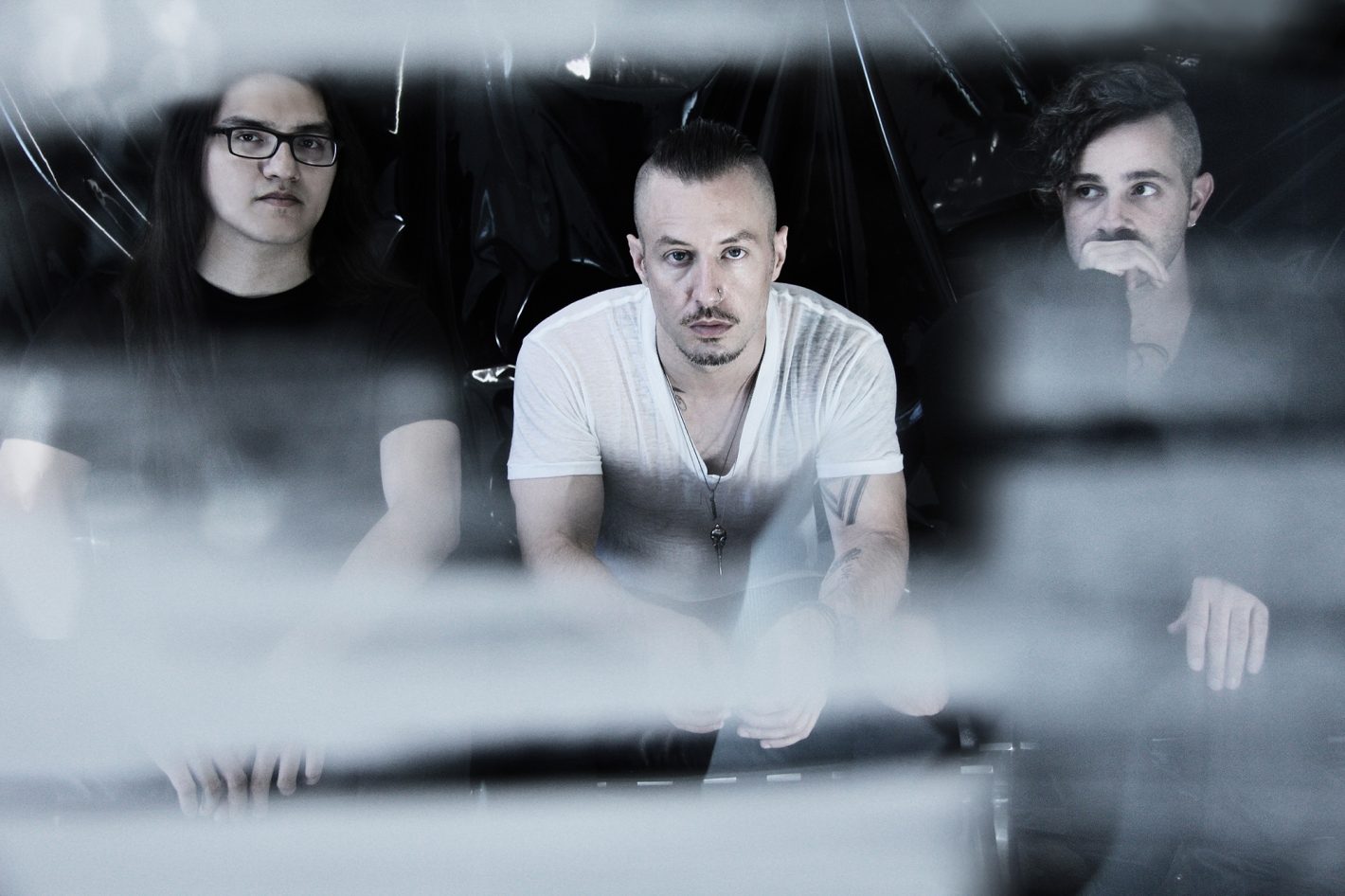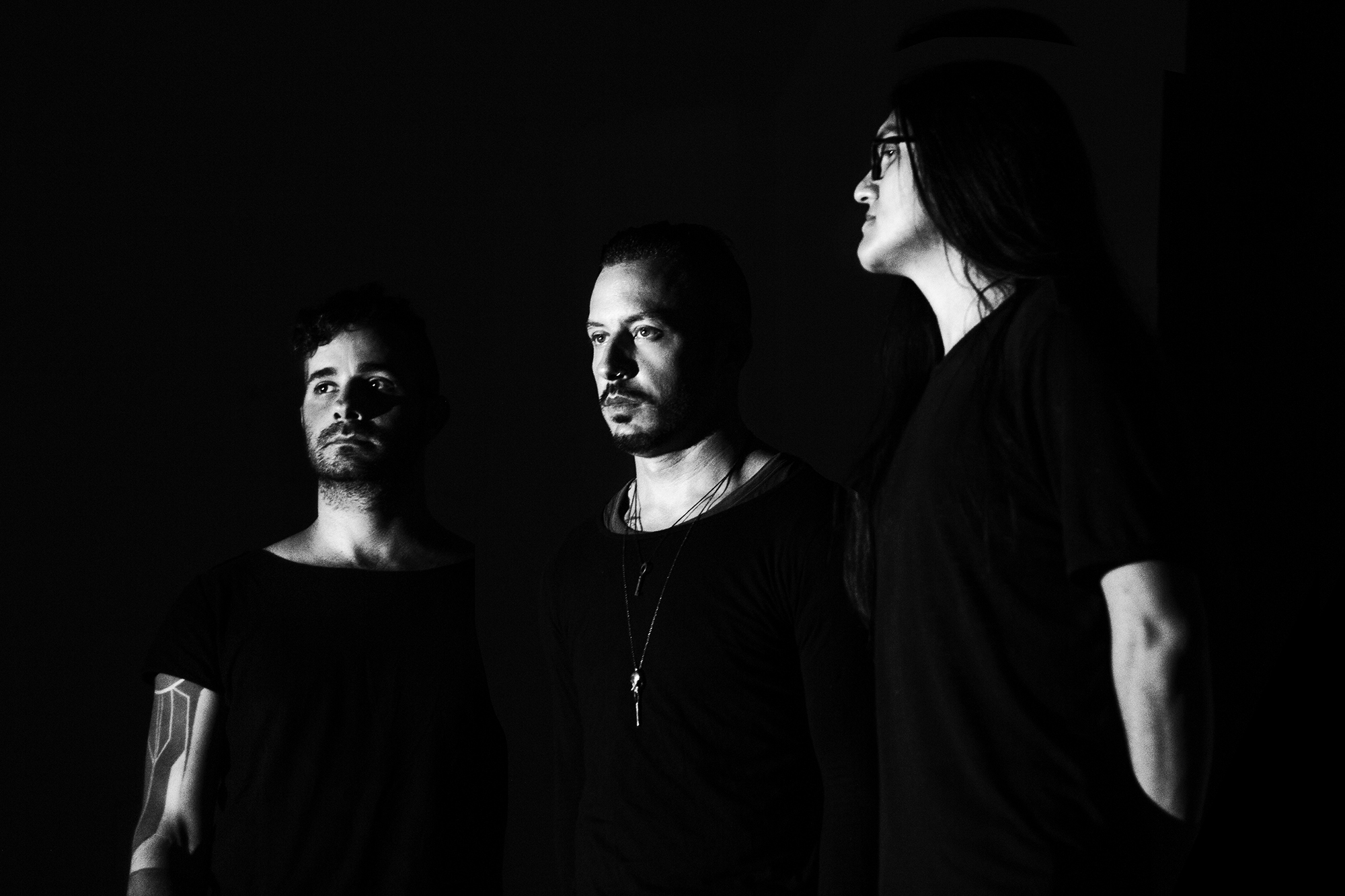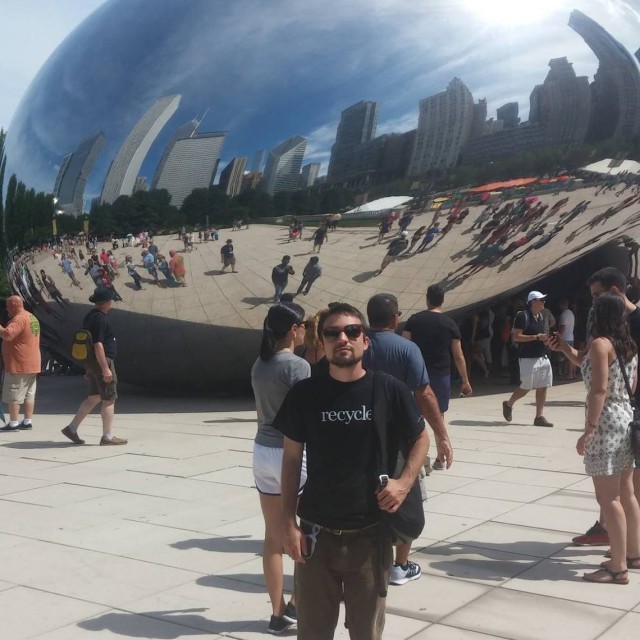 Photos by Jen Whitaker
Photos by Jen Whitaker
Aggression can place a wall of flame between us and the world—a clean line that incinerates the ambiguous, in-between things that might compromise our true selves. For a performer, to employ aggression copiously and in a sustained manner might seem a daunting feat, and physically, it can be. But it can also be daunting to let the wall come down clean, to simply sing, with little to mediate the intimate space between you and the field of watching eyes. For Greg Puciato—known for fire-breathing, stage-leaping, blood-spilling and generally letting his Id run wild as vocalist for math-rock/metal outfit The Dillinger Escape Plan—this was exactly the challenge faced in his 180 turn toward moody, melodic darkwave as frontman of The Black Queen. No longer able to dissolve his ego completely inside the acid-bath assault of Dillinger’s precise chaos, the emotional core of his writing is now more fully revealed. Whatever risks he takes, artistically or physically, his fans have been more than game to come along for the ride.
The Black Queen, comprised of Puciato alongside Joshua Eustis and Steven Alexander—both of whom were formerly involved with Nine Inch Nails—seem to wander the shadow fields of Pluto when compared to the blazing pits of Mercury that Dillinger leapt out of. Three years in, and now touring in support of their second album, 2018’s Infinite Games, the group has found a smoldering equilibrium that suits them well, allowing Puciato’s dynamic vocals and gifts as a lyricist to come to the forefront.
Infinite Games takes on the uncomfortable liminal spaces of relationships, inhabiting an emotional no-man’s land of shifting desires with infrequent glimpses of solace. Both thematically and production-wise, there are flattering echoes of Pretty Hate Machine-era NIN, along with late ’80s Depeche Mode, balancing the former’s angst with the latter’s mournful elegance. The boost in thematic clarity also comes alongside Puciato’s renewed interest in writing. His new book of poetry and photography, Separate the Dawn, was released in February, but was pieced together between the dissolution of Dillinger and the release of Infinite Games, laying bare many of the fears, character flaws and frustrated reaches toward inner peace that have beset the sometimes troubled, always dynamic artist. In an era of oversharing, Puciato manages to cultivate a mystique that keeps the material from becoming too caustic, a gift that pairs well with The Black Queen’s shadowy soundscapes.
At either extreme of Puciato’s expression, his work is the product of a restless, detail-oriented energy, the magnetism of which continues to bring new fans into orbit from all genres. Below, we find out about the mixed blessings of this energy, the possibilities it’s opened and how The Black Queen has taken it to new heights.

You’ve remarked on the difficulties and sheer anxiety of transitioning from the more external, aggressive energy of your other groups to the more vulnerable, subdued atmosphere of The Black Queen. Two albums in, has that bridge of discomfort been fully crossed?
That sentiment is one that I struggle with pretty nonstop. It’s more or less an intimacy disorder. It comes from a lot of places, and I’m aware of them all, but it doesn’t make it go away. I just can manage it and overcome it a bit easier. The creation process with The Black Queen, or in any capacity, that’s not scary, because I’m mostly alone when I’m writing. Performance-wise it still is. Releasing vulnerable things still is. Those things still take acclimating. Probably always will. It’s so much different from Dillinger because the scale is smaller. My eyes are closed most of the time. If I open them, it’s like, “Oh shit I’m in a room full of people that aren’t going ape shit. This is a bit intense. Lemme just keep these closed.” It’s easier to cover more distance internally with your eyes closed anyway.
What does this group demand of you performance-wise compared to your other projects?
It’s funny; the headspace isn’t too much different. I just try to lose my guard as a performer, to get to a place where I’m tapped in in a way that I could still be if there were no audience and I was alone in a room. In Dillinger it was the same, but the irony there is that a lot of the Dillinger lyrics were an aggressive guard. But yeah, you’re trying to just drop your skin, really.
From a technique [and] vocal standpoint, any damage I might have is way more noticeable, and that freaks me the fuck out. So I am a lot more protective of my voice for TBQ than I was for DEP. But yeah, for TBQ, I basically have to be at 100 percent or I go into a really deep fucking pit of perfectionistic OCD thought-looping afterwards, thinking I’m a complete failure as a person, more or less, all because my voice was at 90 percent instead of 100. Perfectionism is a bitch. Being an artist or a performer, or anyone, who gives this much of a shit about what they do, is more or less a self-abusive mental disorder.
Does the more “extreme” energy get subsumed? Does it arise elsewhere in the music, lyrics, etc?
I still feel it all in me. I feel like there is a ball of fire, like a pilot light, inside of me that very easily can become an inferno. I know how to harness that into endless creative or physical performance energy, but I also know how hard it is for me to turn off, and how much it can consume my life. I feel it onstage still. I feel like my cells are going to explode. When I hit a note in a way that I didn’t intend, I want to twist the mic stand into a pretzel. A lot of what I’m trying to deal with now, in performances that are as nuanced vocally as this is just understanding that even on my best night I still can’t control every single milli-detail of my voice, and being OK with that. It’s just frustrating because you don’t get a do-over until the next show. Again, it’s all just the flipside of trying to get the best out of yourself, and that is amplified when you know people paid to see you.
From some of the published pieces I’ve read, I take the concept of Infinite Games to be something symbolizing ambivalence in personal relationships—sets of rules and negotiations that serve as a substitute for trust where it might not naturally occur. How would you reiterate the “games” concept?
Yeah, you hit it on the head. Everything is autobiographical for me. So Infinite Games is more or less something that I realized I was playing along with, or initiating, perpetuating, whatever, in my life with various relationships as a way to not let them die, or to stay engaged with them, to not fully suffer the loss of them, to not have to make concrete decisions involving them. As a way to stay engaged or not bored with life, maybe? But more so, I think to not have to fully process loss or change. Cycles of mutual manipulation with people you love in some capacity. Ultimately it’s learned behavior. And I, like most people, learned it growing up. So it’s defined my life in a lot of ways. Cycles of codependency. Gaining recognition and control over that has been a big theme in my life for years, starting consciously with Dillinger’s One of Us is the Killer.
Do you find that these games are ultimately healthy/unhealthy, useful/detrimental, or none of the above?
Well, I mean, that’s arbitrary. Healthy or not, a lot of phases are necessary to help you get to the next one. I wouldn’t have had anything to scream about if I didn’t have things I needed to work through or manage. I’m not a fan of screaming or aggression as a genre, I don’t care anymore than any other genre. Probably less. I was never trying to make a contribution to a genre or a medium. I was just expressing abstractly. When things came into focus, or I gained more self-awareness, the tools remained the same but the intent became more focused. So in hindsight, healthy or unhealthy? I think it depends on whether you are aware or not. Once you’re aware, you know too much, then it’s hard to see those habits as being anything other than unhealthy. But at the time they got me from point A to E or wherever I am now. So … useful for sure.
Has more melody-focused, synth-oriented music presented new opportunities, modes of expression? Where were you creatively/personally when The Black Queen started versus where you are now?
When we started I was very aware of the trajectory I was on, as far as seeing the limitations of extremely violent music for me. I could see where I was going psychologically; I could see that I was starting to scratch the surface of something I would eventually get out of me, or to the bottom of. I also saw the limitations for how much I would be able to artistically actualize in DEP. On a surface level, musically, I’ve always been extremely into melody, extremely into the obvious TBQ influences: R&B, shoegaze, ambient, freestyle, drone. I feel now though that things are pretty open-ended. I don’t see a limitation to where we can go from here. The most horrifying part—releasing the first TBQ stuff—is over. Now I feel free. I could still make something as violent as DEP was—I still have it in me—but I don’t have enough of it in me to make albums and albums worth of it, and I don’t think it’s quite the same anymore. I’d make a wall of sheer noise sooner than I’d scream about how frustrated or depressed I am. I don’t want to ever be in a place where I have that much of that in me again. Behind the scenes it’s not fun, mentally speaking.
Your book, Separate the Dawn, is about to come out. Does that material dovetail with the work you’ve put into Infinite Games and The Black Queen in general? How does the music and the writing interact with each other?
Yeah it’s directly connected to the last two Dillinger albums and the two TBQ albums. It’s just an extension of the things I was dealing with. As an only child, I spent a lot of time alone. Writing. Making songs. It’s always been my way to deal. I feel something resembling anxiety, or depression, or in the case of TBQ, it can be a positive sentiment, and if I feel so much of it that it seems like it’s going to burst from me, then I write. And whatever that writing is, is a capsule or a bubble, and it kinda shows me what I’m thinking. It keeps me honest. It’s madness, really, releasing things. Feeling compelled to. I don’t quite fully understand it yet, or why people do. But it for sure has something to do with making sense of this existence, feeling like you’re not alone. Like sending a signal off into space wondering which aliens might find it and be able to understand it.
Someone is leaving their house to go out into the city at dusk. How does their night logically progress if Infinite Games is both the musical and thematic soundtrack to it?
To me a lot of TBQ is about embracing abandon and connection in the face of the unknown, or in the face of possible impermanence. So maybe you go out, you meet someone new, you end up at an afterhours warehouse party together, maybe you’re both drinking if you drink; maybe you’re both on drugs if that’s your thing. You end up sneaking off and sitting on a rooftop or a fire escape together with both of your phones dead, and neither of you care, watching the sun come up, telling each other everything you can, realizing the absurdity of it all but not caring, trying to freeze the moment as long as you can. Having an adventure out of your normal comfort zone, with someone you just click with, that changes you somehow, pulls something out of you, and being on the precipice of wherever that encounter may go. It could end in heartbreak, it could end in forever, it could end in great friendship, it could end in nothing but a memory and a reinvigorated energy in being alive. All of these things are ultimately good.
Look, whatever it is you thought you were gonna do Tuesday, March 26, 2019, go ahead and cancel that shit and get to Holy Diver to see The Black Queen live. Opening are Uniform, and SRSQ. Doors are at 7 p.m., and tickets are $20 in advance, $25 day of. ALL AGES. For more info on the show, visit Holydiversac.com. For more info on The Black Queen, check out Theblackqueen.com.
**This piece first appeared in print on pages 20 – 21 of issue #287 (March 13 – 27, 2019)**


Comments